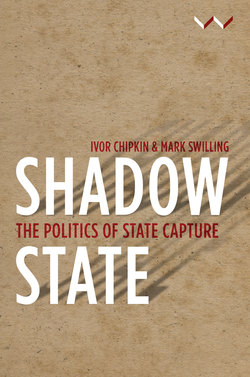Читать книгу Shadow State - Camaren Peter - Страница 10
На сайте Литреса книга снята с продажи.
ОглавлениеForeword
Mcebisi Jonas
In March 2017, a few weeks before Pravin Gordhan and I were removed from the Ministry of Finance by former President Jacob Zuma, I met with Professor Mark Swilling at the Sustainability Institute in Stellenbosch. Mark and I had known each other and worked together for many years and he is someone I had come to rely on in the academic community. I had asked Mark to meet with me to discuss my increasing concern about the polarised, and frankly deliberately rudimentary, debate that was emerging on state capture. As the pressure was mounting on the perpetrators of state capture, so they were ratcheting up the narrative that this was a political project to displace white monopoly capital – a project of radical economic transformation to free black economic empowerment from the insidious forces of what was increasingly referred to as white monopoly capital. I was also concerned that as South Africans scrambled to grasp the meaning of state capture, there was a propensity to simplify it to ‘corruption’.
It was clear that if we as a nation failed to understand the significance of what we were facing, we would also have to accept that our hard-won democracy would become something that we talked about as lost in our lifetime. That was the danger that we faced.
My concern, like that of many South Africans, was multi-layered – I was distressed at a personal and professional level, and in my case, also as a member of the ruling African National Congress (ANC). When the ANC came to power in 1994, we promised that we would ensure that progressively we would destroy the apartheid-era bureaucracy, and that we would build a capable state to drive forward the agenda of liberating our people and deepening development in our country. It was becoming apparent to me that the significant progress we had made since 1994 in transforming our state institutions into vehicles for service delivery and development, and building the constitutional foundations of our democracy, was under severe threat from the gluttonous tentacles of a small but powerful business and political elite.
By the time Mark and I met, there was already significant pushback against state capture from various sites of accountability, including but not limited to investigative journalists and the media in general, civil society and the judiciary. But we were still observing each new example of state capture as a separate event, denying the connection between them. We were failing to join the dots. And what was missing was the voice of the academic community – the dot joiners.
What was also apparent at that point in time was that state capture was not corruption – it was exponentially more complex, and indeed we were at risk of overlooking a fundamental threat to our egalitarian project if we thought we were only dealing with corruption. This is not to deny the seriousness of corruption, which also undermines development; but through state capture, the rule-making process itself was being captured, legitimising the theft of our nation. This goes to the fundamental difference between corruption and state capture – for the latter, many of its activities may be legal, hiding the gradual, well-organised, but often terminal nature of its ultimate impact.
It was clear that we needed a dispassionate understanding of what was unfolding before us. We needed a factual and analytical narrative. And so I met Mark, as an old friend, to ask him to convene a meeting of academic minds. He did this, colloquially calling the group the State Capacity Research Project; this group moved into and occupied this space, almost without a break for eight weeks (unheard of for academics!), and re-emerged with the report titled Betrayal of the Promise, now published in edited form as this book. The gravity of what they discovered and distilled into this comprehensible, but disquieting, read is best encapsulated in what they termed the ‘silent coup’ – the betrayal of the 1994 promise.
The publication of the report on 18 May 2017 was unintentionally well-timed. Two weeks before, the South African Council of Churches (SACC) – which had become a spearhead of the anti-state capture fightback – had released the draft findings of their ‘Unburdening Panel’, a process they had established to create a safe and trusted space for perpetrators and victims of state capture to come forward. The academics had worked closely with the SACC, having discovered a consistency between the patterns of their findings. The Unburdening Panel draft report was the first portal for the public to begin understanding the gravity of the state capture crisis, the Betrayal of the Promise report followed, and a few days later, the first #GuptaLeaks were broken by the media.
And so, in many ways, this publication – book-ended by the Unburdening Panel report and the #GuptaLeaks – marked a turning point in the popular front against state capture. The dots were being joined.
The importance of the present book lies in its power of reshaping the state capture narrative. For the first time, South Africans have been able to grasp the horrifying reality of what we were facing. But the book must also stand as a strong warning against complacency. We are no longer standing on the brink, but as William Faulkner once wrote, ‘The past isn’t dead and buried. In fact, it isn’t even past.’ We do not need to remind ourselves here of the deep racial, economic and social wounds that mar our country on a daily basis, but we do need to remind ourselves that state capture was simply a symptom of these deep wounds, and they can no longer be plastered over.
